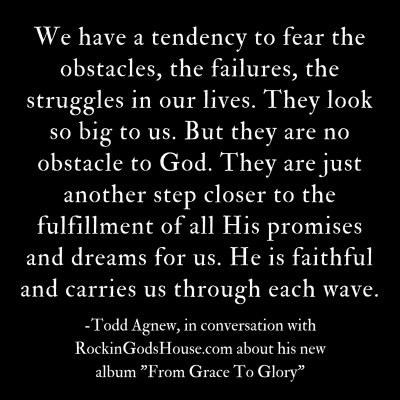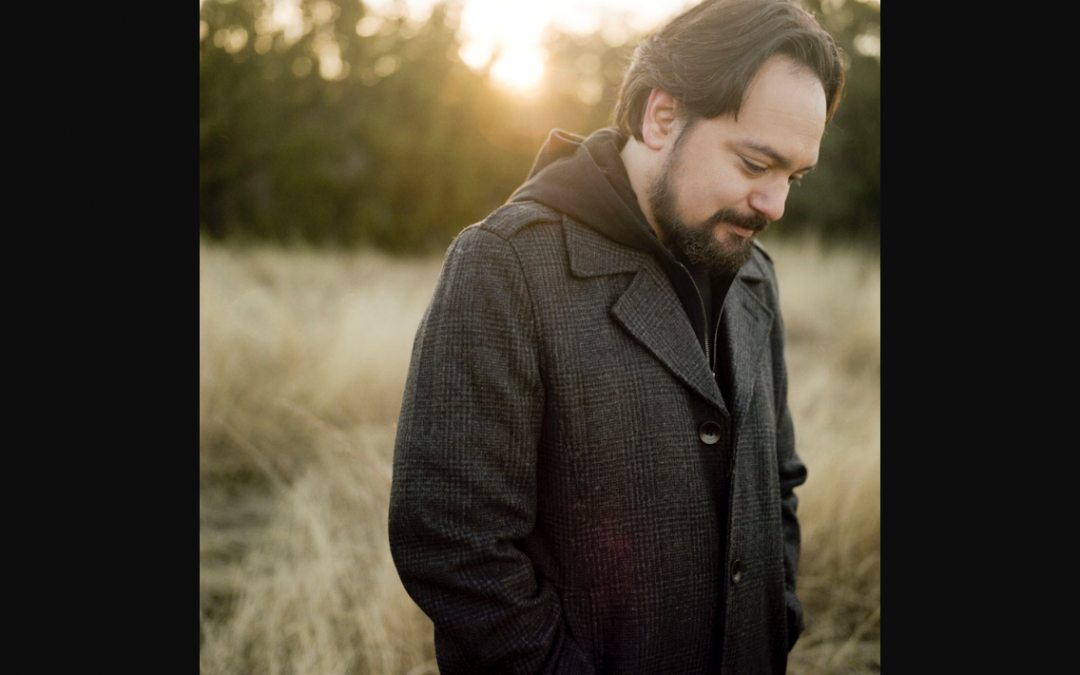 Seven-time Dove Away nominee Todd Agnew has a new album out this year called From Grace to Glory. This most certainly prompted a cry of celebration from his fans because it’s been a few years, 2012, since his last release. One listen through the trackless of “From Grace to Glory” tells you that it has been worth the wait. It s a superb album filled with memorable collaborations and rich theology that gives you a heart-wound, the good kind of heart-wound when the Word goes deep and sticks with you.
Seven-time Dove Away nominee Todd Agnew has a new album out this year called From Grace to Glory. This most certainly prompted a cry of celebration from his fans because it’s been a few years, 2012, since his last release. One listen through the trackless of “From Grace to Glory” tells you that it has been worth the wait. It s a superb album filled with memorable collaborations and rich theology that gives you a heart-wound, the good kind of heart-wound when the Word goes deep and sticks with you.
What’s especially intriguing about this new album is that Todd Agnew has been attending seminary at the renowned Dallas Theological Seminary in Texas. This album functions as a musical mirror of all the work he’s been putting into his seminary education. The intellectual and spiritual feasting he’s been enjoying as a result of that work shines wonderfully on this album.
I had the chance to ask Todd a few questions in an e-interview recently, and he was kind enough to share some intriguing details about his studies and how that has influenced the music on his new album From Grace to Glory:
What prompted you to go to seminary?
I love the Bible and I love learning. So when my wife received a job offer that wanted us to move to Dallas, she encouraged me to look into seminary. In her words, “You study more than anyone I know and you’re not in school!” Seminary was a dream, but one I never expected to see fulfilled. I hoped I would get to audit some classes someday when I retired. But my wife really encouraged me to pursue this opportunity, and DTS does have a path for people like me. I have absolutely loved it.
You’ve had a busy five years since your last album in 2012: you’ve gotten married, become a father, and are pursuing an advanced degree in ministry. How has that journey impacted your role as a singer/songwriter/worship leader?
Life and school have both enriched my ministry, especially as a worship leader. However, for a while, I really struggled with songwriting. The more I learned in school, the more I realized that I didn’t know. About anything. And it made me nervous as a writer. So I was kind of paralyzed writing-wise, until I sat down with a friend and walked through my creative process. We realized that I was learning so much that none of it was getting processed fully, so I didn’t feel comfortable writing about it. I recognized a need to take a few chosen ideas and walk them all the way through my world into understanding, community, and application. Then I could write.
 “From Grace to Glory” has a beautiful mix of themes and sounds, and I’ve enjoyed listening to it. How did you choose the songs that made it into this album?
“From Grace to Glory” has a beautiful mix of themes and sounds, and I’ve enjoyed listening to it. How did you choose the songs that made it into this album?
My label made the suggestion that we do a compilation record. I suggested that we do half of the records as “hits,” and the other half as songs we wish people had the chance to hear. So some of the record is obvious: “Grace,” “Thunder,” “My Jesus.” But for the other half, we just searched through the archives and took suggestions from everyone. I wanted the long version of “When Love Comes to Town,” the Dekker version of “Martyr’s Song,” and “Beautiful” from the Reflection sessions. But the demo of “Corner in Memphis” was a suggestion from my manager Vince Wilcox. He told me he still listens to that version. And Ryan Wiley at Ardent brought up “His Eye is on the Sparrow,” an unfinished track from the NEED sessions. Basically we just kept a conversation going until we felt like we had a record. I’m really glad we get to share these songs.
Very cool to see Rebecca St. James on an album again, and on such a fantastic song! How did you connect with Rebecca for this project? And in general, this album has great collaborations, wow.
Rebecca is a dear friend. “Our Great God” was a track from the Better Questions record. I’ve always been primarily a worship leader, so I always try to purposefully include songs for the church on my projects. But the BQ record was unusual. It dealt with a lot of hard subjects: death, divorce, habitual sin, etc. So I wondered what kind of worship song would fit there. I realized that we would always have questions about God because He is vast and majestic. We cannot comprehend him, so we will always wonder. That was the worship topic. And I had always loved this song. It is by Fernando Ortega who writes so much amazing music. I wanted to do it as a duet and Bec was kind enough to record her part right before she left the country on a trip. It is still a favorite. As far as other collaborations, probably my favorite collaborations are what we do in the studio. It has been so wonderful working with Kim Trammell (drums) and Dave Smith (bass) for all these years. I enjoy the singing side of things, but my favorite moments in the studio are the musical collaborations with so many great musicians.
Your first single, the contemporary hymn “Glory to our Great Redeemer” has a timeless sound and depth (and I also enjoyed the production, from everything to the mix to the reverb-soaked instruments in the background as the band plays in the foreground). How did the song come to be and why is it meaningful to you?
I had read a book years ago that asked a question about why we use so many metaphors about what happened at the cross. We say that we were pardoned, forgiven, adopted, ransomed, redeemed, rescued, and many more. The author asked which one was really accurate and why we used the other ones. So a couple of years ago I began work on “Glory to our Great Redeemer.” But I got four lines into the song and realized that I had already used four different metaphors. So, I put the song to the side. I didn’t want to write something until I felt that I understood it. In my time at DTS, I took a class on Soteriology (the doctrine of salvation) with Dr. Scott Horrell. We had an assignment where we went through the Bible looking at how God explains what happens in salvation. I found that we use so many metaphors for it because GOD uses so many metaphors for it. It is too vast a truth to be simplified into one metaphor. God faithfully paints the truth over and over, adding to our understanding. I immediately returned to the song and finished Great Redeemer. Then, I had Dr. Horrell check it, just to make sure I hadn’t screwed anything up.
I’d also love to hear more about the song “Nearer Home,” which is a personal favorite from the album–partly because 2017 has been a very dark year personally, and the truth that Heaven is our true home has really kept my hope alive, and this song really captures that feeling and experience–beautiful!
The worship staff at the Austin Stone Community Church went on a songwriting retreat one weekend. For one of the writing sessions, Chris and I were paired together. Chris is one of my best friends and we have written together over the years. This time, he brought “The Journey,” a prayer he had found in The Valley of Vision, an old Puritan prayer book. We both loved it and it flowed into a song really quickly and easily. That was one of the easiest songs I’ve ever written. But I think it’s so rich, because it’s true. We have a tendency to fear the obstacles, the failures, the struggles in our lives. They look so big to us. But they are no obstacle to God. They are just another step closer to the fulfillment of all His promises and dreams for us. He is faithful and carries us through each wave.
You’ve recently added ‘college professor’ to your list of titles. Tell us a bit about your role teaching worship theology and worship leadership at Visible Music College. Is it exciting to shape young (and old) minds?
It’s exciting, but scary as well. Most of my generation of worship leaders weren’t taught very much. We were tossed into a youth group and told “Good luck!” I realized a few years ago that I had a lot of experience to share with the next generation and give them a stronger foundation to build on. But then I realized I still wanted more. I wanted to give them a solid biblical and theological foundation, and then encourage them to build on it. So we don’t talk a lot about genres and styles of worship. We talk about the Bible, trying to understand what God has communicated to us about worship.
Back to your experience in seminary: what has been one of the most challenging aspects about getting a degree at seminary? What’s been one of the more enjoyable things about it?
Oddly enough, the toughest thing about seminary has been writing papers. Everyone thought that as a songwriter, papers would come easy. But it turned out to be exactly the opposite. In songwriting, we are trying to get vast theological concepts into three and a half minutes. But when writing a paper, you are taking one small idea and expanding it. So my skills were all aimed in the wrong direction. It took some time and then some insight from a very kind doctoral student to get me on the right path. As far as enjoying, I have loved all of it. Except writing papers. But even in my Greek exegetical papers, it was amazing to dig so deeply into a couple of verses, find the richness of what God has said to us, and even end up writing forty pages on it!
What’s planned for the rest of 2017?
Well, we’re close to the end now, so I have a few shows, and then we’ll shift gears into Christmas music. I had the honor of doing a Christmas record a number of years ago, “Do You See What I See.” It is still one of my favorites. So I love pulling those songs and stories out. Of course, as an instructor, we’ve got finals and all that on the way. My kids have soccer season starting. But Christmas is family time. So we’ll focus on that. And then turn the page to next year.


